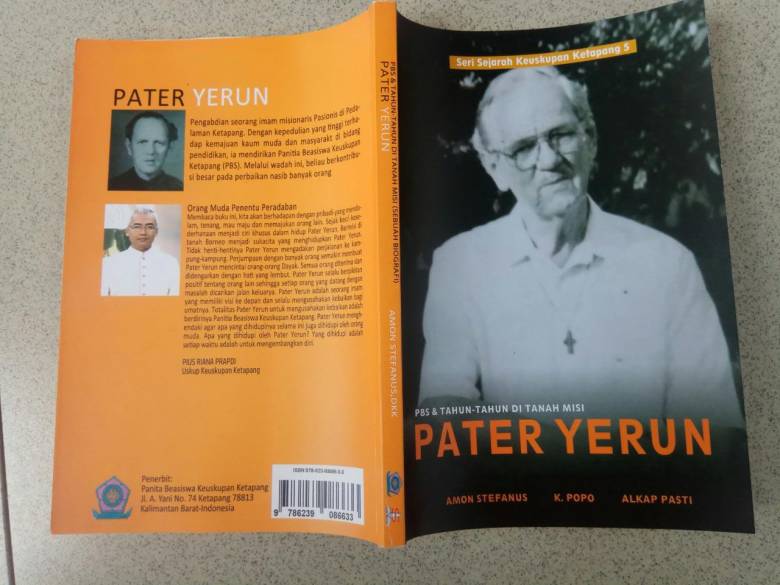Book Review: Father Yerun, Van Lith from Dayak Island

In the early of the 19th century a Jesuit priest named Van Lith came to the Java island for missionary works. History then recorded his major contribution to the development of Catholicism and education in the island. One of the specialties of his works is the approach in education for the social mobility of indigenous peoples.
In the Borneo island, also called as Land of Dayak, almost 75 years later, a Dutchman Passionist priest — Pastor Yerun Stoop CP, took the Van Lith model approach to advancing the Dayak people (in the interior of Ketapang, West Kalimantan) who were left behind in all fields. It was believed that one of the ways to build a better life is through education.
The importance of education for the progress of society is the main message from the contents of the book: Father Yerun, PBS and My years in the Land of Mission (2020). This biographical book tells the story of the missionary journey of a Passionist priest, Pastor Jacobus Cornelius Stoop in the interior of West Kalimantan. He was sent by his ordo to do missionary works among native people of Dayak in the area of Ketapang Diocese now. One of his mission works discussed in this book is the provision of scholarships in the field of education.
The priest believed that education would give the Dayak a way to entrance new era of life.
In Java, Van Lith made a major contribution in the field of education. Van Lith changed his evangelistic method, from evangelizing to individuals to evangelizing collectively in the form of schools. Along with the launch of ethical politics in the field of education, in 1900 the Kweekschool or school of prospective teachers for natives was founded. In short, Van Lith developed school (teacher) education with the aim to put indigenous peoples there to become equal with Europeans.
In Van Lith's last letter, nearing his death, he firmly stated that if he could choose, his choice would fall to the Dutch East Indies.
Dealing with his education development, we got to know big names as students from Van Lith such as IJ Kasimo and the first native Bishop Albertus Soegijapranata. They were only two of more than 600 students during 1898-1922 who were registered as students at the Xaverius College, Muntilan, Central Java. The most important value concerning nationality and freedom was what the students got from Muntilan school, The alumni get the same basic vision of self-development, community progress and national life. Catholicism and the nationality of Indonesian are the same entity and cannot be separated from one another.
Unlike Van Lith who founded a school (teacher), Pastor Yerun Stoop CP in the interior of Ketapang did not build a school. It can be understood that in the interior of West Borneo at that time everything dealing with education was completely limited. Until the 1970s, there were only primary and secondary schools in the area. Pastor Yerun realized that this level of education was not enough. It is necessary to have Dayak children with a higher education to contribute to the progress of their region.
It was because that reasons that in 1978 he and Dayak figure Petrus Yosef Denggol, after obtaining the approval of the Bishop of Ketapang then Gabriel William Sillekens CP, founded a simple but important institution called Panitia Beasiswa Keuskupan Ketapang, or the Ketapang Diocese Scholarship Committee (PBS).
There were some young Dayak the diocese sent to Java for priest school. But this time, to Bishop Sillekens, PY Denggol asked to find and send non-seminarians Dayak children to go to high schools at university level in Java. And, if Van Lith established a teacher school, the Ketapang Diocese PBS would initially send selected children to attend teacher schools in Java, to be precise at IKIP Sanata Dharma Yogyakarta. It is in the hands of these IKIP graduates, that they will become teachers in the villages, the progress of the Dayak community is placed. These teachers will be able to take care of themselves, teach people and children, be involved in church and community activities—making social mobility in relatively short of time.
The Ketapang Diocese PBS institute later in the period 1979 - 2000 succeeded in sending nearly 600 young people, most of them were Dayak children, to go for high level of study. They attended high school and various state and private universities in Indonesia. Like Van Lith who produced prominent figure such as IJ Kasimo or Albertus Soegijapranata, PBS alumni who were sent by PBS currently take on quite a lot of roles in the fields of education, private sector and local government.
On one occasion, Bishop Pius Riana Prapdi of Ketapang said that the presence of PBS and the involvement of its alumni in community life have provided its own color for the development of the people and society in Ketapang Diocese. And in this book Bishop Pius Riana wrote that young people are the determinants of civilization. Education will be successful if there are individuals who determine the nation's civilization, he wrote.
Like Van Lith, who spent his love for the Javanese people in the Indies, Father Yerun stated in one of his letters: .. Even though I had left Ketapang 2 months ago, that does not mean that I have forgotten. My heart is still in Ketapang. In his previous writings, he said that he had learned many things from his missionary journey in Bumi Borneo. He continued, after decades of living and working in the Dayak community, I can honestly say that I love the Dayak people.
Three days before Christmast in 2017, 23 December 2017, the priest who pioneered the Dayak path of progress, breathed his last in the Netherlands. He is buried in the cemetery of the Passionist Monastery, Moulenhop.
It is to remember Father Yerun’s works in education and the progress of the Dayak of Ketapang this 178 page book was written. Really, it is an interesting book. It tells the early conditions of the development of the Catholic faith in Ketapang, West Kalimantan, the story of Pastor Yerun's vocation and missionary work during 1953-1978, as well as a discussion of the Ketapang Diocese Scholarship Committee and its contribution. In short, it is about love, work dan humanity.
Welcoming 75 years of Passionist presence (and work) in Indonesia in June 2021, this book is worth reading. (*)



